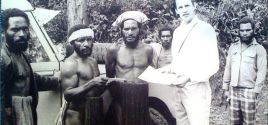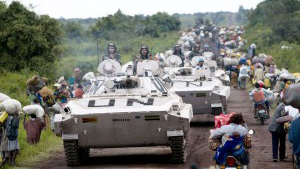The UN Declares War on Katanga -- Againby William GriggApr. 02, 2013 |
Popular 
'Woke' Google Fires 28 Employees Who Protested Gaza Genocide

Report: Blinken Sitting On Staff Recommendations to Sanction Israeli Military Units Linked to Killings or Rapes

America Last: House Bill Provides $26B for Israel, $61B for Ukraine and Zero to Secure U.S. Border

Bari Weiss' Free Speech Martyr Uri Berliner Wants FBI and Police to Spy on Pro-Palestine Activists

The Guardian on Papua New Guinea Cannibalism: People Were Eaten 'Out of Respect'
  Fifty-three years ago, the United Nations created a multinational military force to carry out "peacekeeping" operations in the Republic of the Congo at the request of socialist president Patrice Lumumba. Residents of a small, mineral-rich province called Katanga, not eager to be ruled by the Soviet-aligned leftist government, declared their independence under the leadership of pro-western president Moise Tshombe. Fifty-three years ago, the United Nations created a multinational military force to carry out "peacekeeping" operations in the Republic of the Congo at the request of socialist president Patrice Lumumba. Residents of a small, mineral-rich province called Katanga, not eager to be ruled by the Soviet-aligned leftist government, declared their independence under the leadership of pro-western president Moise Tshombe.With the backing of both the U.S. and the Soviet Union, UN military forces were deployed to Katanga, where they carried out bloody punitive actions that killed scores of innocent people and prompted a widespread international outcry. A British inquiry documented acts of rape, plunder, and terrorism committed by multinational Blue Helmet forces. (Perhaps the best account of the UN's terror war against Katanga's independence, and the ugly colonial politics behind it, is found in Philippa Schuyler's book Who Killed the Congo? ) In their war against Katanga's bid for independence, the UN's mercenary force behaved in precisely the fashion Idaho Senator William Borah had predicted when he helped defeat the first attempt at "world order" decades earlier. During the Senate debate over the proposed League of Nations, Borah warned that the envisioned world army would consist of "the gathered scum of the nations organized into a conglomerate international police force ordered hither and thither by the most heterogeneous and irresponsible body or court that ever confused or confounded the natural instincts and noble passions of a people." Echoes of the UN's war to suppress Katanga five decades ago were heard last week when UN officials reported that armed separatists in Katanga had attacked army and police personnel before forcing their way into a UN compound in the city of Lubumbashi. The UN Security Council responded by passing a Chapter Seven resolution -- the world body's equivalent of a declaration of war -- authorizing the deployment of a multinational military brigade to disarm and "neutralize" rebel groups in Congo. The United Nations has never been a peace organization. British journalist Simon Tisdall, author of America, Hitler, and the UN, points out: "American critics of the United Nations often zero in on its lack of serious military capacity "¦ [and consider it to be little more than ] ineffective do-goodery gone wrong. Imagine their surprise, then, to learn that the UN was born amid nude scenes in a White House bathroom and that its primary purpose was as a war-fighting machine." As Establishment court historian Arthur Schlesinger, Jr. points out, the chief enemy targeted through the UN was the American public itself -- or at least that segment of it who embraced our country's pre-1898 non-interventionist ideals. "For Roosevelt, the critical task in 1943-45, beyond winning the war, was to commit the United States to postwar international structures before peace could return the nation to its old habits," wrote Schlesinger. "So he moved methodically to prepare the American people for a continuing world role"; this meant, among other things, putting in place key elements of the UN system, beginning with the financial institutions -- the World Bank and International Monetary Fund (the latter of which is now engaged in overt confiscation of private bank accounts in Europe). "Above all, FDR saw the United Nations, in the words of [presidential adviser] Charles E. Bohlen, as `the only device that could keep the United States from slipping back into isolationism," Schlesinger continued. "He was determined to put the United Nations in business while the war was still on so that the American people were still in an internationalist mood; hence the founding conference in San Francisco, which took place after his death but before victory. And, as Winston Churchill emphasized, the new international organization `will not shrink from establishing its will against the evil-doer or evil-planner in good time and by force of arms.'" The UN defines its mission as enforcing "collective security" -- and war is always implicit within that self-appointed mandate. The world would be immeasurably better off were the world body to disappear. |



